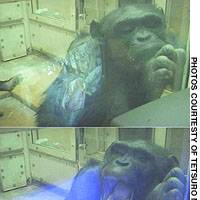Chimpanzees watching video scenes of other chimps yawning yawned more often in response, proving contagious behavior occurs among primates other than humans, according to a report by a group of scientists.
The group led by Tetsuro Matsuzawa, a professor at the Primate Research Institute at Kyoto University, reported the findings in the July 28 issue of the Royal Society's Biology Letters. A version of the British journal was online Saturday.
Matsuzawa and others tested six female chimpanzees aged 19 or over at the institute in Inuyama, Aichi Prefecture, showing them video images of other chimps repeatedly yawning as well as scenes of other chimpanzees showing open-mouth facial expressions that were not yawns.
Each video scene lasted three minutes and scientists monitored the adult chimps' behavior during the airing and three minutes afterward.
During and after the open-mouth videos, the six chimpanzees yawned 4.7 times on average, but they yawned 10 times on average during and after the videos of real yawns.
Among the six, Ai and Mari, both 27, showed significantly higher frequencies of yawning after viewing the yawn videos.
Ai yawned twice during and after the open-mouth video, but 24 times during and after the yawn videos. The frequency of Mari's yawning jumped to 25 from nine.
The scientists also examined the behavior of three infant offspring of the six, all 3 years old. None yawned at any time during the tests.
Studies have shown that between 42 percent and 55 percent of human adults will yawn during or shortly after seeing a videotape of other humans repeatedly yawning. But children aged 4 or under do not show this contagious yawning effect, according to the report.



